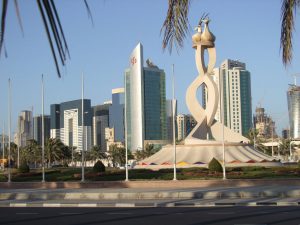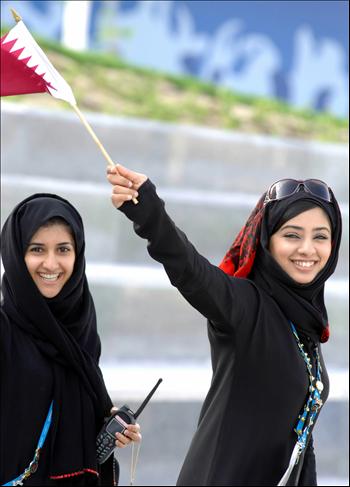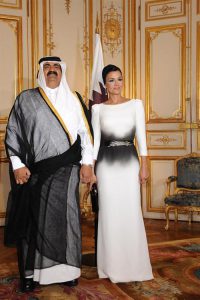Much like other small Gulf States in the Arabian peninsula finding recent and in-depth stories about gay life is not easy.  The biggest public kerfluffle about homosexuality in Qatar in recent years has not concerned any gay executions, witch hunts, persecution or demands for gay marriage.
The biggest public kerfluffle about homosexuality in Qatar in recent years has not concerned any gay executions, witch hunts, persecution or demands for gay marriage.
Rather, in December 2010 the football/soccer World Cup association (FIFA) awarded to Qatar the playoffs in 2022. Completely overlooking the social impact of such a huge international event in such a tiny Islamic place as Qatar FIFA got itself into hot water from human rights organizations as well as gay rights associations.
The disruptive issue was homosexuality. Thousands of football fans are LGBT –many from the ‘liberal’ West– will enter Qatar for the game finals. Very few are prepared to suddenly surrender their sexual identity and stop being gay for a week. However, homosexuality is illegal in Qatar and can be punished with lashes and jail, which offends the progressive agenda of rights groups in the West. It is unavoidable that a clash of cultures will occur; a collision of east-versus-west against Qatar’s tightly bound sexual and social standards, both straight and gay.
The Situation in Qatar
“Qatar, an Arab state on the Persian Gulf, is a monarchy with no constitution or political parties. It is governed by the ruling Al-Thani family through its head, the Emir. The judiciary is nominally independent, but judges hold their positions at the Government’s pleasure. The law does not provide for freedom of speech and of the press, and the Government imposes some restrictions on these rights in practice.
“The right of association is limited strictly. The law prohibits all workers, including foreigners, from forming labor unions. Workers are prohibited from engaging in collective bargaining. Wages are set unilaterally by employers without government involvement.
“The activities of women are restricted closely both by law and tradition. For example, a woman is prohibited from applying for a driver’s license unless she has permission from a male guardian. The Government adheres to Sharia law in matters of inheritance and child custody. Muslim wives have the right to inherit from their husbands. However, they inherit only one-half as much as male relatives. Non-Muslim wives inherit nothing, unless a special exception is arranged. Women may attend court proceedings but generally are represented by a male relative; however, women may represent themselves. According to Shari’a, the testimony of two women equals that of one man…” Read more.
Deviance from (mostly heterosexual) cultural traditions or Sharia law is responded to with harsh punishment. There are reports of foreigners being jailed and whipped as well as deported for actual or alleged deviant activity in Qatar.
 The UK gay football group, The Justin Campaign, as well as activist John Ameechi, said it was deeply concerned: “despite their apparent commitment to humanitarian values and the promotion of global solidarity through football, FIFA is sending out a message loud and clear that the rights of the global LGBT community do not even register on their agenda… Sport should never be allowed to trump human rights. FIFA have put their corporate interests before the human rights of the people of Qatar (and elsewhere)… this is a stark and sad reminder of just how much work we still need to do.” (FIFA earned an estimated $3.5 billion from the 2010 World Cup event in Johannesburg.)
The UK gay football group, The Justin Campaign, as well as activist John Ameechi, said it was deeply concerned: “despite their apparent commitment to humanitarian values and the promotion of global solidarity through football, FIFA is sending out a message loud and clear that the rights of the global LGBT community do not even register on their agenda… Sport should never be allowed to trump human rights. FIFA have put their corporate interests before the human rights of the people of Qatar (and elsewhere)… this is a stark and sad reminder of just how much work we still need to do.” (FIFA earned an estimated $3.5 billion from the 2010 World Cup event in Johannesburg.)
Some have called upon Qatar to decriminalize homosexuality by 2022.
This whole issue might have quieted down after a while but it was blown out of proportion (or into proportion!) by subsequent comments by the FIFA President Sepp Blatter who tried to minimize the concerns of the gay football fans worldwide by saying that gays, to avoid trouble, should simply not have sex while in Qatar: “homosexual fans should refrain from any sexual activities that are illegal in Qatar”.
Not being accustomed to dealing with explosive social issues, this was hardly good PR for FIFA. Immediately there was a worldwide protest against his bizarre comments. Later, realizing his gaffe he went on to say,” “It’s another culture and another religion, but in football we have no boundaries. We open everything to everybody and I think there shall not be any discrimination against any human beings, being on this side or that side, left or right or whatever. Football is a game that does not affect any discrimination. You may be assured … if people want to watch a match in Qatar in 2022, they will be admitted to matches.” Exasperated at a later time he thought there was “too much concern” for the World Cup in Qatar. However, he later offered a direct apology. Read more.
In February 2011, UK PM Cameron was asked about awarding the World Cup to a homophobic country that criminalizes homosexuality. Read his reply. It remains to be seen what actually happens ten years from now in 2022.
Meanwhile: Being Gay in Qatar
Simply put, if a foreigner wants to be openly gay in Qatar his life will be very difficult (if not impossible). But he will only have to fear prison or legal action if he is open about it. He will also have to hide the fact that he is married to his partner, if he is. If the partner is present, both must act as relatives, or simply as friends. If they are going to be gay in private it should not provoke any reaction. But the current advice is to be sure that it is completely hidden. Read more.
However, even if a gay person is modest and discreet he (unlikely she) may be targeted by foul-minded local Qatari men for any number of reasons such as blackmail, money, sexual abuse or religious enmity. For foreigners, being single over the age of 30 is a suspicious cue; dressing with some fashion, being well groomed, smiling at others, being gentle and polite can be construed as gay traits.
In the mid-2000’s a Finnish gay man was seduced and eventually entrapped by a “gorgeous” Qatari man who at first offered him alcohol then hashish and eventually sex–“many times”. One evening another gorgeous guy showed up with him and things got out of hand and the expat found himself arrested–because he was gay? He never found out. After being in jail for more than two weeks with no charges made against him he was bailed out by his ambassador and left the country as quickly as possible after paying an exorbitant fine that left him nearly broke.
Reflecting later on this traumatic experience, he said, “the guy who initially was my ‘friend’ planned all this. He misused my sexual orientation. He was the one who started asking me about hash. Later I got to know that the police were all the time behind him, dictating his actions, so I think it was because of my gay orientation I was arrested. That’s how much they hate us–and not just because of gay sexuality; they envy and hate our freedom.” Read more.
No Places, No Friends
This commentary came from a reader of Gay Middle East in Qatar about the lack of social support and absence of a gay community. “In Qatar, the situation is different from Jordan. There are no gay places here, except one, and in my opinion, we can’t say that it’s really gay because it’s the only place where guys can enter without girls, and a lot of straight guys go there as well. Another big difference here is the lack of gay relationships. After living in Qatar for quite a while, and talking to a lot of guys in the net, only one or two guys have told me that they have boyfriends. And it’s not only love relationships, but friendships are also rare in Qatar among gays.
“In Jordan, I knew many people and 90% of my friends were gay, but here, after a long time, I have succeeded in finding only one gay friend whom I have met and stayed in touch with by the phone. I think that the the reason for this is the lack of gay places in Qatar. I’m sure that if there were a gay cafe and everyone went there every week, the bond between guys here would be stronger.” Read original report.
From The Heart
The following is a heart-wrenching narrative from a Qatari young man who had the good fortune to go to a high school for a while in the USA. But the experience has turned out to be a bittersweet experience as he relates here.
 “I’m a transfer student in the U.S. from a tiny little country called Qatar. Lots of GLBTQ online media is blocked by our government (I was sad when I went home last summer and couldn’t access AfterElton.com!), but I’ve been a good follower of it since I’ve been able to. My question is mainly towards the type of “it gets better” talk that takes place. Most of what I hear is “high school sucks, stick it out, it will get better after that and your family/friends may or may not be okay with it eventually.”
“I’m a transfer student in the U.S. from a tiny little country called Qatar. Lots of GLBTQ online media is blocked by our government (I was sad when I went home last summer and couldn’t access AfterElton.com!), but I’ve been a good follower of it since I’ve been able to. My question is mainly towards the type of “it gets better” talk that takes place. Most of what I hear is “high school sucks, stick it out, it will get better after that and your family/friends may or may not be okay with it eventually.”
“That really says nothing at all to someone from a similar culture as mine, because: 1) Though high school still sucks, there is no “going off to college” or making your own life: most kids aren’t expected to move out until they’re married, and some don’t move at all even after that. Very few people actually get their own place before marriage (and even fewer without ever getting married) but those are “oddballs” everyone stares at, talks about, and stays away from (and isn’t an option for single women either).
2) It’s a family-oriented culture. My family, direct or distant, would almost always use “we” when they mean “I” –everything we do has to always be viewed from a full family perspective, not an individual’s. It’s rarely an option. At the same time, your countless amount of cousins are your friends as well as family, so to come out or pretty much do anything out of the norm is, almost literally, to lose everyone you know.
“For someone who has grown up under such a perspective of ‘family first’, it’s really difficult to even consider going off on my own. In all honesty, it just sounds selfish to me, especially knowing my siblings sacrifice a lot of who they are as well for the sake of family. During a conversation when my brother visited a few weeks ago, I had told him I marched as a “straight ally” with my friends. His response was that “if a photo of that gets home, you’ll give dad a heart attack and I’d kill you.” (Neither of that would happen, but that’s the general reaction towards coming out/being gay.)
“Deep down, I know he knows I’m gay, but neither of us can admit it. We’re supposed to suppress that and countless other things for each other. Being gay is forbidden in Islam and unfathomable to people. It might change in the future, but now isn’t that future.”
It would be hard to find a more direct and honest confession from a gay Qatari person about his cultural and personal ‘fate’ in that country. Speaking here is a gay heart yearning to be free yet tied to forbidding circumstances that are likely to confine and define his entire life including marriage to someone he can’t fully love, producing some offspring and waring a mask behind a closed door to authentic love and intimacy. Read original report.
A Scandal Suppressed
In 2004 a potential scandal was suppressed and thus avoided when the Qatar’s 25 year old Crown Prince Tamim Bin Hamad Al-Thani was allegedly seen at a London gay bar and was involved in an altercation. But details are sketchy and as usual with high profile, powerful and politically connected royalty the event was quickly buried behind closed doors and stop-press orders.
To make this situation even more bizarre, the press quoted Dr Yusuf al-Qaradawi, a Muslim fundamentalist scholar based in Qatar, as saying homosexual behavior is deserving of corporal punishment including being stoned to death. Dr Qaradawi’s ghastly support for the execution of the Crown Prince was reported by Aljazeera. Read more.
Not surprisingly the Prince was married in January 8, 2005 to his cousin, H.H. Sheikha Jawaher bint Hamad bin Suhaim al-Thani. As of 2011 they have three children. Meanwhile, on 3 March 2009 Sheikh Tamim married a second wife, Anoud bint Mana Al-Hajri, daughter of H.E. Mana bin Abdul Hadi Al-Hajri, sometime Qatari Ambassador to Jordan. He divorced her in 2010; they had one child, a daughter.
So the spicy gossip appears to have been sufficiently buried for now.
Questionable Motives
It doesn’t help to improve Qatar’s attitude toward human sexual rights when the Emir’s wife, Sheikha Moza bint Nasser, sponsors a program (funded by a US university) to promote traditional family mores: “to provide specialized treatment for all kinds of behavioral deviations that require thorough intervention and treatment by specialists.” Obviously homosexuality is among the deviations in Qatar although the university has insisted that human rights would be respected in any of their operations and programs. Read more.
Another dark side of hidden homosexuality in Qatar is revealed in recent reports of sex-trafficking of poor gay Kenyan male students who have been lured to Qatar with the promise of good jobs only to find they’ve become entrapped by wealthy Qatar locals to use for their sexual pleasure.
This should come as no surprise given the fact that where sexuality is suppressed there arises a black market for sexual pleasure (as well as cheap labor). Human trafficking of course happens every where there is poverty, carnal desire and money. It’s a vicious cycle that is perpetuated by greed, inhuman behavior, depravity toward impoverished, ignorant and usually unskilled laborers desperate to support their families (that are often the result of ignorance about family planning in rural areas). Read more.
















